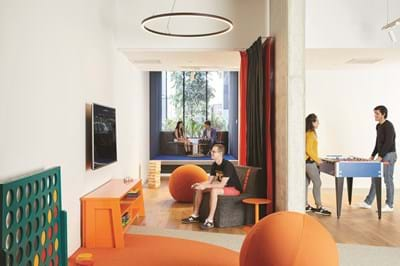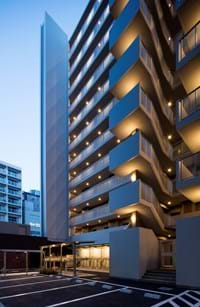- Home EN
- News
- Latest news
- 2021
- Bouwinvest stakes out ‘beds and sheds’ subsegments from Sydney office
Bouwinvest stakes out ‘beds and sheds’ subsegments from Sydney office
The Covid-19 pandemic has reinforced Bouwinvest’s view that a granular approach to its logistics and residential investment strategies is the way forward in the Asia-Pacific region. The company is now also looking at alternative asset classes such as data centres and health care related real estate.

Tjarko Edzes had already gained a good understanding of the lie of the land and where the best real estate opportunities were to be found in Asia-Pacific markets well before opening Bouwinvest’s regional office in Sydney in early 2019. The company’s Director of Asia-Pacific Investments had visited Australia and the other key countries Bouwinvest is targeting in the southern hemisphere multiple times over several years prior to taking up his new post on the ground and had already sized up the most promising sectors. But having a home base in the region has made a huge difference in how Bouwinvest is now being perceived locally and managing its Asia-Pacific portfolio has also become much more efficient, he said during an interview via Teams for the Real Value for Life newsletter.
“Our Sydney office has given us a lot more opportunities to engage with our local partners and visit real estate properties in the region. About one third of our Asia-Pacific portfolio is located in Australia so having an office here means we can visit our assets quite easily and don’t lose a lot of time travelling. It has also definitely improved and intensified our communication with partners and enhanced our deal flow.”
The Sydney office was barely open a year before Covid-19 struck. How has the fallout from the pandemic affected your investment strategy?
“Nobody has been able to travel with the lockdowns, including our partners in Europe and the Asia-Pacific region. So it has been good to have a base here as we now have a time zone advantage for communicating with our partners in Shanghai, Singapore, Tokyo and Hong Kong. In terms of investment strategy, we were already focusing more on logistics and residential formats and both sectors have done very well, even during the pandemic.

We already had a strong presence in student housing thanks to our joint venture with Scape, an Australian student housing platform, that we launched in 2016, and we are now looking more closely at alternative forms of residential that meet people’s needs throughout their lives. There has been much more debate about investments in offices as well as retail, which has been severely impacted by Covid, but the volume of our retail investments in this region is quite limited.”
How has the Asia-Pacific portfolio performed in the past year?
“Asia-Pacific markets have coped quite well with Covid-19 and it remains a very dynamic and interesting region. In terms of ESG, Australia is a global leader compared with some other parts of Asia-Pacific, which are lagging behind. We continue to see a shift in terms of the region’s share of the global economy and consumer spending and by 2030 APAC will account for 60% of consumption worldwide. If anything, the pandemic has accelerated that shift. Our portfolio has done much better overall in 2020 than we had anticipated upon start of the lock-downs. At the same time everybody was expecting opportunities to emerge last year, but the market here has held up quite well. We now see some positive trends and remain open to attractive opportunities.”
The logistics and residential real estate sectors have emerged as the winners of the Covid-19 pandemic, but pricing is keen. What is Bouwinvest’s strategy for these two sectors in Asia-Pacific?
“We clearly made the right strategic choices. We had already started investing in the logistics space in Japan and Australia from 2013, and consequently partnered with LOGOS for logistics development through a co-investment in Singapore and more recently a joint venture in China. Logistics assets have certainly become more pricey over the past few years, but a lot more money is now chasing deals as investors are focusing less on other real estate sectors. Those dynamics and very low interest rates continue to push up prices.
Our Chinese partnership is targeting the key markets around Beijing and Shanghai which all have attractive macro-economic fundamentals, growing populations and strong supply and demand dynamics. More generally within the logistics sector, we see opportunities for a wider variety of different types of assets from big boxes to last-mile logistics.
Are you looking at any new real estate asset classes?
“The pandemic has highlighted the need for data centres, and we think this is an attractive segment, dependent on market specific supply and demand dynamics. If you look at the demographic trends, healthcare related real estate is also interesting. We are also looking to broaden our residential exposure with new rental formats for co-living, senior housing as well as healthcare related accommodation such as homes for people with a disability. Affordability has become an even more pressing issue in the past year as housing prices have continued to rise and we are keen to expand our investments in this segment due to the strong demand and low risk level.”
It’s worth noting we are looking at investing in actual real estate propositions together with a partner rather than through a blind pool investment fund. Our local presence certainly helps to underwrite new strategies and programmatic joint ventures, which typically come with stronger governance. We always invest with a local partner in asset classes that we have prioritised and being here helps us to underwrite deals and communicate more effectively.
Lockdown measures and travel restrictions have severely restricted the movement of international students to Australia. How is this affecting your student housing portfolio there?
“Student housing has definitely been impacted by the travel bans for Australia, though domestic students can still study and rent space. Bouwinvest is mainly involved in developing new product so we haven’t seen any impact because the developments have not yet been delivered. Our longer-term view of the market is still very positive, but borders need to re-open. Australia is particularly well-placed to attract international students – the quality of education here is excellent and Australian universities rank in the top 50 worldwide. Australia has also done a very good job in managing the coronavirus and has a safe image. Australia also has an advantage over other markets such as the UK and US, as it is in the same time zone for students from Asia. As soon as travel bans are lifted, we expect to see a recovery in the number of Asian students coming here.”
Bouwinvest has invested in Asia Pacific via funds including your participation in a Greystar vehicle targeting multifamily residential assets in top-tier Chinese markets, but increasingly you are working with local partners such as Scape in Australia, LOGOS in China and Singapore and residential developer Kenedix in Japan. Will this shift continue?
“Joint ventures now account for about 50% of our assets under management in the Asia-Pacific region and we are open to forming new partnerships with interesting strategies. We are constantly looking for attractive investment opportunities and partners with high ethical standards and strong track records. Networking is much easier for us now that we have an office here and it’s fair to say that we’ve been approached by more groups as we are now seen as being more local. During the pandemic, however, the focus has been on our existing partnerships and so far, we have grown from the joint ventures we have in place. If you already have a fruitful partnership, it’s easier to expand that, possibly also into new subsegments such as last-mile logistics or other residential formats.”

How do you translate Bouwinvest’s emphasis on Real Value for Life within the APAC mandate?
“The affordable rental housing we are helping develop in China, Japan and Australia provides local residents with alternative options to live in desirable locations. We are looking for investments that are sustainable and add value to society. When we invest in offices, it’s important for us that the building makes a positive contribution in terms of being fit for purpose in a post-Covid world and offering a healthy workspace. The Asia region is, broadly speaking, somewhat behind in terms of ESG and addressing climate risk and we do require our partners to participate in benchmarks and improve performance in these areas. To achieve these goals, it’s crucial to have the right operator and work with specialists in their respective sectors.”
Bouwinvest’s goal when you set up the Sydney office in 2019 was to boost assets under management from €900 million to €1.5 billion by 2021. Have you met that target?
“Yes, and we are well on track to grow our assets under management to €1.8 billion by 2023.”
